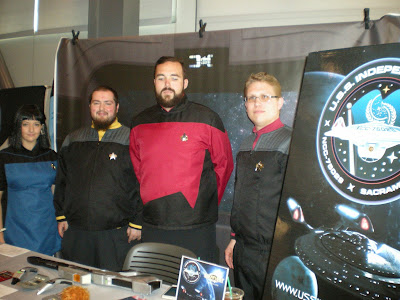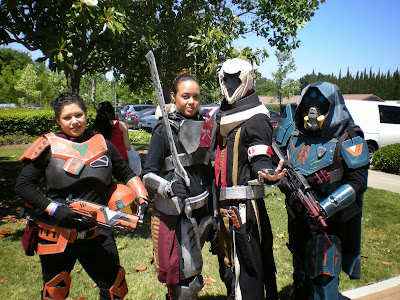(If you missed part one of this topic, you can read it here.)
Last time, I went over some highlights of day two of West Sacramento’s Intergalactic Expo. I also went over in my article about how so-called outdated sci fi can be read or viewed as alternate timeline or retro future sci fi. If you missed these, then you can read about them here. Now for the second part to both these discussions.
Last time, I went over some highlights of day two of West Sacramento’s Intergalactic Expo. I also went over in my article about how so-called outdated sci fi can be read or viewed as alternate timeline or retro future sci fi. If you missed these, then you can read about them here. Now for the second part to both these discussions.
Intergalactic Expo Highlights, Day 2, Part 2
Let me begin by concluding my highlights of Intergalactic
Expo which occurred the weekend of May 2nd and lasted through
Sunday, in which Sunday is what last week’s post was highlighting. If you want
to know about events for Saturday of the con, then please check out my post forthat weekend. (In that post I
talk about the panel on female characters in Josh Whedon’s films and television
shows, collectively known as the Whedonverse.)
On the second day of Intergalactic Expo, May 3rd,
after the table talk with JP Aerospace, I attended the panel on Doctor Who, held in the council chamber
of City Hall. It was hosted by Sac Who, Sacramento’s dedicated Doctor Who fan club. The panel was
somewhat freeform and so a lot of it was question-and-answer based and
discussed the current happenings in the world of Doctor Who, including the current and upcoming seasons of the show.
I don’t remember the details of what was discussed on the current and upcoming
seasons, which is partly due to arriving at least 15 minutes late since I was
getting lunch at the Wicked ‘Wich café across the street. The other reason I
can’t remember the details is my life-long bad memory.
I do remember, however, that someone in the panel’s audience
brought up Neil Gaiman’s episodes that Gaiman wrote the scripts for. I was
surprised to find out that Gaiman wrote as many as four episodes for the show.
I’ve been a big Gaiman fan since I read his Neverwhere
nearly 10 years ago and I knew he was going to write for a Doctor Who episode when it was talked about on the sci fi fandom
and news websites. However, I didn’t know about the three additional episodes
until the panel. I don’t get the BBC channel, unfortunately, and the series on
dvd is hard to come by. Neither do I do streaming video rental much; maybe it’s
time for me to get a Netflix subscription.
Then another attendee in the audience brought up how Gaiman’s
episodes leaned more towards fantasy elements than science fiction ones. This
didn’t surprise me since Gaiman writes much more fantasy than science fiction. But
I’m not dismissing his episodes as unplausible yet (I haven’t seen them yet). With
Doctor Who and its concept of
multiple and parallel universes, anything can happen.
After the Doctor Who
panel, I went across the street to the Black Box Theater inside the community
center to check out the “Sci Fi Comedy Hour”. It was an hour of live comedy
acts based on sci fi favorites such as Star
Trek and Star Wars. They were
hilarious while still being family-friendly, something reminiscent of the 1970s’
Carol Burnett Show only sci fi.
By the way, if you want to really see a sci fi geeky comparison
to Carol Burnett’s comedy, check out two acts from her show. One spoofs Star Trek and the other does a
double spoof: a spoof on As the World
Turns, only this one is “As the Stomach Turns”, and a spoof on Close Encounters of the Third Kind in
which Tim Conway plays the alien (he already had the big forehead for
it!). This second act I was not able to
find on YouTube so you’ll have to find it elsewhere on internet or on a dvd of
Carol Burnett’s show, sorry.
Meanwhile, back at the con . . . they used to rename the
Black Box Theater the “Black Hole” theater for the convention, but for some
reason they didn’t do it this year. I wish they would have, even though “Black
Box” isn’t bad and still connotes the mystery that sci fi explores.
After the comedy hour, in the same theater, was the cosplay.
I had gone off to check out the vendors before they closed up and so I got to
the cosplay late, during intermission to be exact. But I was there in time to
hear Sacramento Star Wars-themed punk
band Mos Lively perform who had some really far out tunes. I asked them if they
had any albums out and they said, if I remember correctly, they were currently
working on one. But you can listen to some of their stuff at their website,
Moslikely.bandcamp.com.
The cosplay pretty much closed the convention for the year. Hopefully it will
be even bigger and better next year. It’s come a long way in just three years!
 |
| Sacramento Star Trek Fan Club, The U.S.S. Independence at Intergalactic Expo 2015 Photo Credit: Steven Rose, Jr. |
 |
| The Winning costume team of Intergalactic Expo's cosplay. They depicted characters from the video game, Destiny.Photo Credit: Steven Rose, Jr. |
No Such Thing as Outdated Sci Fi in this Age of Alternate History, Part 2
Blade Runner is
the future that might have been even though we haven’t arrived at the year it’s
set in yet which is 2019. It’s doubtful dominant usage of payphones will be
making a come-back in only four years from now. But this movie already has elements
of retro futurism with its film noir style conveyed in the main character’s,
Decker’s, cop-type character and his girlfriend’s, Rachael’s, ‘40s hairstyle.
Then in Philip K. Dick’s 1968 novel that the movie was based on, Do Androids Dream of Electric Sheep?,
there are television “news” propaganda shows with painted flats of the outside
world instead of photo-digitalized ones. In this novel, we can either interpret
“painted” as being the term for digitally coloured (as it has come to be used
today) or we can interpret it as a retro-future where computer technology has
not advanced at the common level as it has today.
Ray Bradbury’s Martian
Chronicles was written during a time of popular belief in intelligent
humanoid beings living on Mars and an
anticipation that Earth would colonise the red planet by the 1990s. There’s an
alternate history/retro future novel. And perhaps more importantly, George
Orewell’s 1949 novel, 1984, may not
superficially reflect today’s culture and the story’s technology may be clunky
even by 1984’s standards. However, it’s an alternative history, particularly a
parallel universe story, since we have the controversy of government hacking
and internet privacy today.
Real science fiction is storytelling that asks, “What if
this scientific or technological phenomenon were to occur?” Can’t it also ask
“What if this scientific or technological phenomenon had occurred?” The science fiction of 20 or more years ago asks
this question any time we read or view it. Do you think science fiction can
ever become outdated as long as today’s subgenres of alternate history,
alternate universes/timelines and retro futurism continues attracting a
following? Please feel free to leave your answers in the box below.
Until next time . . .
Comments
Post a Comment